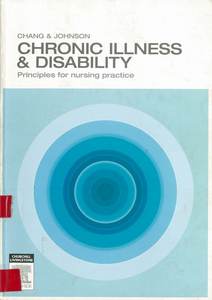Management of chronic pain
Tollefson, Joanne , Piggott, Karen, and FitzGerald, Mary (2008) Management of chronic pain. In: Chang, Esther, and Johnson, Amanda, (eds.) Chronic Illness & Disability: principles for nursing practice. Elsevier, Chatswood, NSW, Australia, pp. 110-125.
![[img]](https://researchonline.jcu.edu.au/7326/4.hassmallThumbnailVersion/7326_Tollefson_et_al_2008_cover.jpg)
|
Image (JPEG) (Book Cover)
- Cover Image
Download (110kB) |
|
|
PDF (Published Version)
- Published Version
Download (1MB) |
Abstract
[Extract] Chronic pain is suffered by a significant number of people from all age groups. Most of these people manage the pain themselves in a range of positive and sometimes negative ways - they take analgesics and remedies and modify their lifestyles to accommodate changes that may accrue in elements of life such as function and affect. People who suffer from chronic pain classically refer themselves to general practitioners who now act as agents for a broad range of conventional and complementary specialists to manage chronic pain. The majority of nurses become involved in the care of people with chronic pain when it affects function or psychological wellbeing to such an extent that independence in activities of living (Roper et al,2000) or self-care needs(Orem, 2001)are adversely affected.
These nurses take a supportive and educative role to enable people with chronic pain to recognise positive strategies that ameliorate their state of pain and maximise their independence. However, there are nurse practitioners who specifically work with people who are referred to pain clinics and there are specialist nurses who work with people with conditions that are particularly associated with enduring pain, for example people with cancer and specialists in oncology nursing, or people with long-term angina and specialists in cardiac rehabilitation nursing. These nurses work in multidisciplinary teams and have extended knowledge of the aetiology of chronic pain and skills in the assessment, therapy and evaluation of chronic pain management. This chapter is written for nurses and other health professionals as a broad overview of a complex topic. There is no intention to delve into the specifics of specialist diagnosis and treatment but rather to draw a picture of the size and the nature of the problem, and the array of therapies that are available to suit particular individuals with chronic pain. While we refer to nursing and nursing theories of self-care, we recognise that the management of chronic pain is essentially in the hands of individuals and that support for them comes from a range of health professionals whose roles can overlap to a large degree in the offering and delivery of a person-centred philosophy of health care service.
| Item ID: | 7326 |
|---|---|
| Item Type: | Book Chapter (Research - B1) |
| ISBN: | 978-0-7295-3868-8 |
| Keywords: | chronic pain; educative supportive roles; pain assessment; self-care; self-management |
| Related URLs: | |
| Date Deposited: | 14 Jan 2010 04:38 |
| FoR Codes: | 11 MEDICAL AND HEALTH SCIENCES > 1117 Public Health and Health Services > 111708 Health and Community Services @ 100% |
| SEO Codes: | 92 HEALTH > 9204 Public Health (excl. Specific Population Health) > 920403 Disability and Functional Capacity @ 100% |
| Downloads: |
Total: 2216 Last 12 Months: 20 |
| More Statistics |



